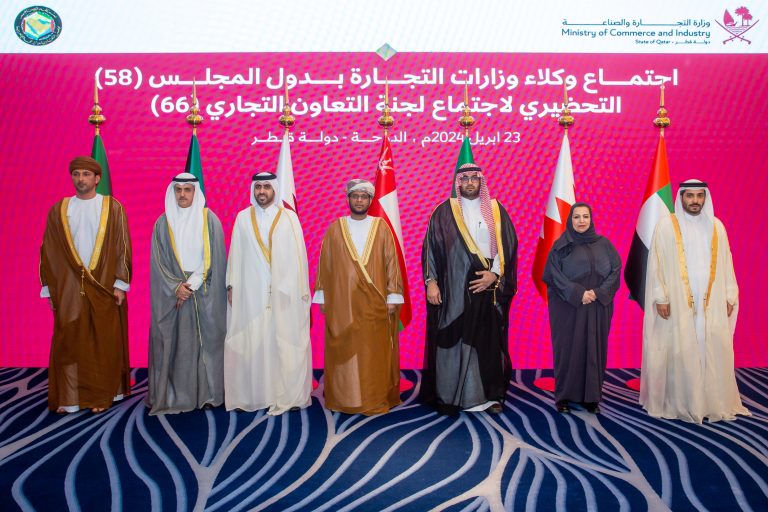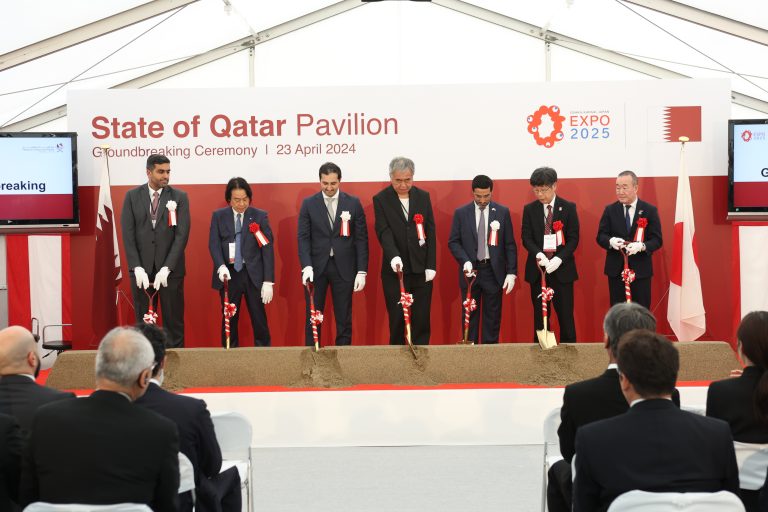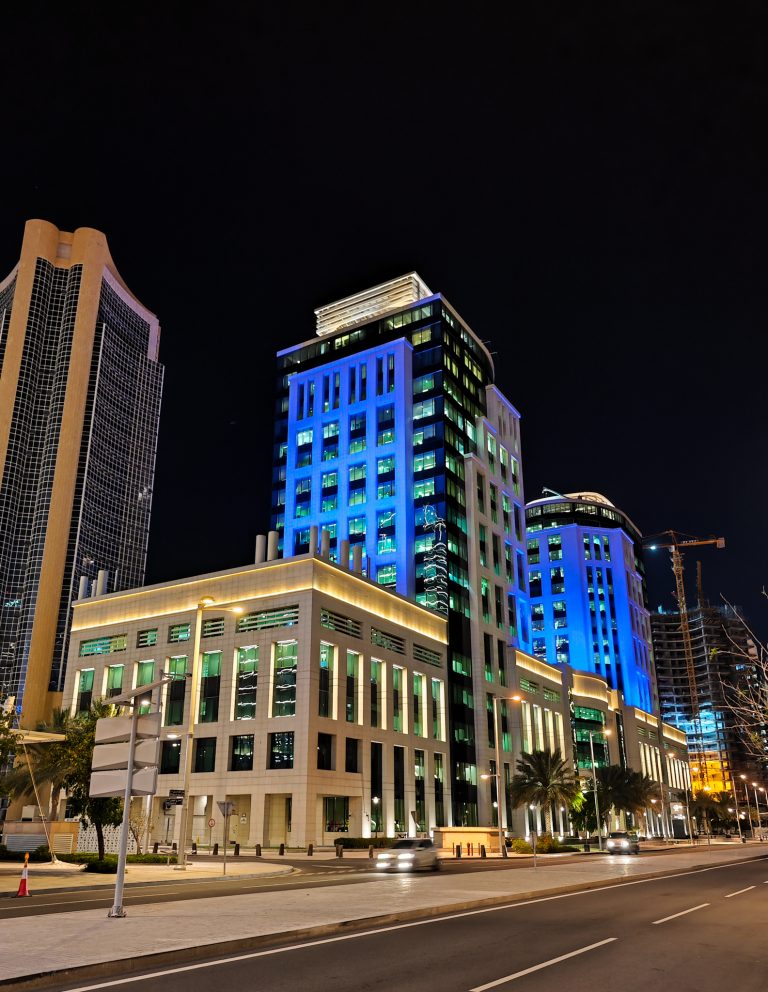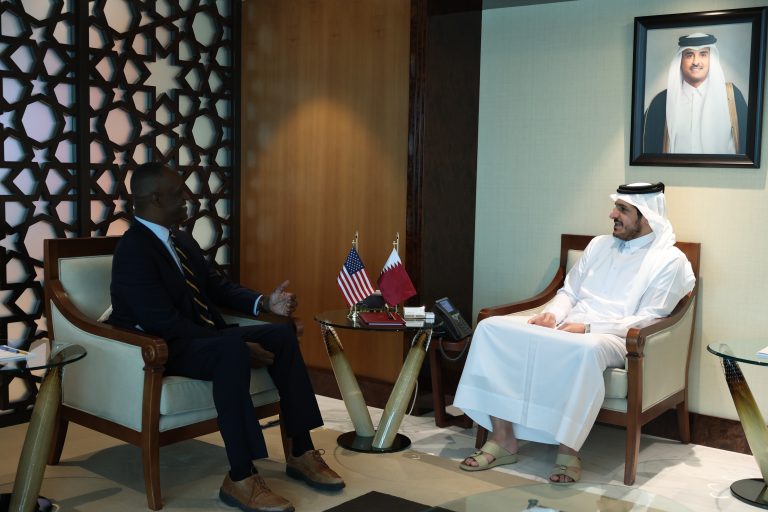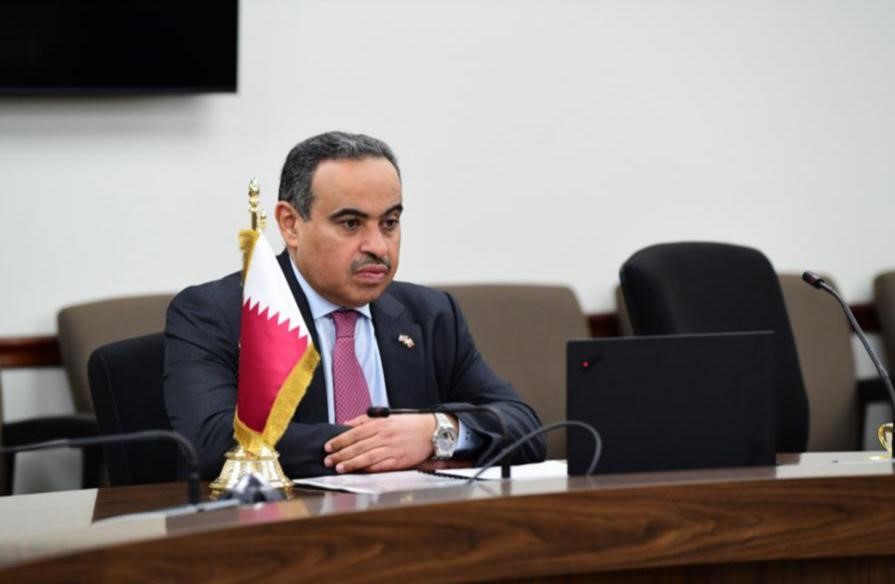
H.E. Mr. Ali bin Ahmed Al Kuwari, Minister of Commerce and Industry, participated today (Monday, September 14, 2020) in the private sector engagement event held on the sidelines of the third US-Qatar Strategic Dialogue, which was organised by the US-Qatar Business Council in cooperation with the US Chamber of Commerce, using video conferencing technology.
The event was held with the aim of enhancing communication with US companies, highlighting the legislative framework governing the business environment in Qatar, and shedding light on investment and partnership opportunities between the Qatari and American private sectors.
The meeting was attended by Sheikh Khalifa bin Jassim Al-Thani, Chairman of Qatar Chamber; Sheikh Mohammed bin Faisal Al Thani from the Qatari Businessmen Association; H.E. Mr. Wilbur Ross, US Secretary of Commerce; H.E. Mr. Tom Donohue, CEO of the US Chamber of Commerce; Ambassador Anne Patterson, President of the US-Qatar Business Council; and Khush Choksy, senior vice president for Middle East and Turkey Affairs at the U.S. Chamber of Commerce.
The meeting also brought together representatives of government entities, and major Qatari companies from various sectors, in addition to the US private sector and senior executives in a number of industries, including energy, defence, financial services, engineering, construction, health, technology and security.
Speaking at the opening of the private sector event, H.E. the Minister said the meeting provided an important platform to discuss investment opportunities with American and Qatari officials and businessmen.
H.E added that Qatar looks forward to embarking upon the second edition of the Qatar Economic Roadshow in the U.S., which was previously planned to take place this year but had to be postponed due to the coronavirus pandemic.
H.E. said the year 2020 has seen major achievements for Qatar, despite the significant challenges arising from the outbreak of Covid-19, which disrupted supply chains and normal business operations around the globe.
In fact, Qatar has been at the forefront of countries across the region in enforcing measures to protect the health and safety of its citizens and residents, while embracing an integrated strategy to bolster trade and economic activities with its partners around the world, H.E. explained.
In this context, Qatar has maintained its commitment to the multilateral trading system and strengthened international cooperation frameworks, to ensure the continuity of trade as the engine for economic recovery, H.E. said, noting that Qatar has stepped up efforts to enhance its advanced logistical networks, and to capitalise on its high-quality infrastructure, to consolidate its position as a regional and global trade and investment hub.
H.E. added that Qatar offers investors access to logistic areas and free zones in strategic locations that are in close proximity to Hamad International Airport and Hamad Port, as well as a high-speed road network designed in line with the highest international standards.
Qatar’s free zones allow investors 100% foreign ownership and offer tax exemptions and partnership opportunities with Qatari entities, H.E. said, noting that investors also have access to a skilled workforce and investment funds.
Moreover, HE. explained that Qatar’s highly developed infrastructure acts as an important catalyst for companies to invest in value-added sectors, particularly the industrial, technological and logistics sectors.
Touching on the laws that Qatar has enacted to attract and encourage investments, H.E. said Qatar has taken important steps in this direction, including the issuance of a Private Public Partnership law that expands the country’s investment horizons. The law also provides a legislative framework for improving governance and risk management, and promoting competition and innovation to bolster Qatar’s dynamic business environment.
H.E. explained that investors will have the opportunity to finance, develop and operate projects in a variety of priority sectors including food security, sports, tourism, health, education and logistics.
In this context, the PPP law will deliver a major boost to Qatar’s business environment as preparations continue to host the 2022 FIFA World Cup with the development of new projects, H.E. said.
H.E. also elaborated on the benefits of the law regulating the investment of non-Qatari capital in economic activity, which allows up to 100% foreign ownership across all sectors and economic activities, and offers exemptions from income tax and customs duties on the import of machinery and equipment.
H.E. added that Qatar also issued a law allowing non-Qatari individuals and companies to invest in the strategic real estate sector through investment funds, and to own properties in several vital economic and tourism areas across the country.
Qatar has also launched key initiatives to bolster its investment sector, H.E. said, referring to the establishment of the Investment Promotion Agency and the launch of the Single Window initiative that brings together more than 22 government agencies under one platform to streamline investment procedures and fast track the issuance of commercial and industrial licences, allowing investors to establish companies in Qatar at any time, wherever they are based around the world.
In this context, H.E. highlighted that Qatar has put in place a system which ensures that companies can have the utmost confidence in their investments, and provides them with the greatest potential for success. He noted that these key reforms have already bolstered the inflow of foreign direct investments, and created a dynamic business environment that appropriately protects and supports foreign investors.
H.E. added that Qatar is currently focused on developing its private sector, and SMEs in particular, and on facilitating their participation in development projects. This strategy is already paying dividends, with the industrial sector attracting more than $72 billion in investment in 2019. H.E. said Qatar’s spending on infrastructure projects and its expansion of the Small and Medium Scale Industrial Area will provide myriad opportunities for the private sector to tap into and build on this momentum.
H.E. invited participants to visit Qatar to explore its remarkable business environment and take advantage of the tremendous opportunities that the state offers, noting that most attendees are already familiar with the Qatari market, which is home to more than 850 U.S. companies that are either fully owned by US investors or in the form of joint firms.
H.E. added that Qatari-U.S. bilateral trade amounted to more than $9.43 billion in 2019, an increase nearly 90 percent compared to three years ago, while the U.S. is now firmly established as the leading source of Qatar’s imports, which have grown more than 100 percent since 2017.
Qatar is also investing heavily in the U.S., partnering with American companies in a range of sectors, H.E. said, noting that Qatar Investment Authority is channeling up to around $45 billion in investments in the US with partners across a wide variety of sectors from coast to coast, in addition to investments in the U.S. energy sector by Qatar Petroleum.
H.E. explained that these strong economic bonds have helped solidify the foundation of the broader Qatar-U.S. partnership, a deep and multifaceted relationship built on a range of shared strategic and cultural interests and values.
Building upon the strength of these ties, H.E. pointed to the emergence of opportunities to to bolster this partnership even further.
H.E. voiced hope that this relationship continues for generations to come in light of the role that American companies have played as an integral contributor to Qatar’s national development.
He reiterated that Qatar remains a true and committed partner to building and maintaining an optimal business environment, where private companies will have every opportunity to flourish.
H.E. concluded his remarks by expressing the hope that the meeting will contribute to encouraging new American companies to seek new investment partnerships with the Qatari private sector, to begin to realise the full potential of the already robust Qatar-U.S. relationship.
H.E. also thanked officials from the U.S. Chamber of Commerce and the U.S.-Qatar Business Council for organising the event.
H.E. the Minister announced the signing of a memorandum of understanding between Widam Food Company and Tyson Fresh Meats Company, to supply protein in the food and agricultural business sectors. The MoU aims to establish bilateral trade relations in the meat field.
H.E. the Minister then took take part in a Q&A session alongside his US counterpart. The session, which was moderated by Mr. Mohamed Barakat, Executive Director of the US-Qatar Business Council, featured questions from business executives on the investment and trade environment in Qatar.
Speaking at the event, Qatar Chamber’s Chairman HE Sheikh Khalifa bin Jassim Al Thani said the U.S.-Qatar Strategic Dialogue highlighted the strength of bilateral relations, noting that the previous rounds of dialogue were a great success, featuring the ratification of several MoUs and agreements that bolster joint cooperation.
H.E. Sheikh Khalifa noted that the US and Qatar share strong and deep-rooted relations across various fields, including trade and investment, while bilateral trade has achieved great growth rates in the past few years.
Touching on the investment field, Sheikh Khalifa noted that Qatar is home to hundreds of fully-owned U.S. companies and joint US-Qatari firms in different economic sectors, adding that he hoped new U.S. companies would invest in Qatar.
Urging Qatari and U.S. businessmen to take advantage of the incentives that both countries offer, Sheikh Khalifa called on them to forge new economic alliances and commercial partnerships that benefit both sides.
Speaking on behalf of Qatar Businessmen Association Chairman Sheikh Faisal bin Qassim Al Thani, Sheikh Mohammed bin Faisal Al Thani, QBA member, said: “We cannot avoid today addressing the current health crisis that is weighing on the global economy. This crisis, has not only revealed the significance of local supply chains and self-reliant economies but also brought attention to the fact that development and innovation benefits not only innovators but also the entire globe. Likewise, economies rely not only on domestic spending but also on foreign investment and spending. Today, supply chains transcend not only national borders but continents.”
Elaborating on the importance of forging ties between Qatari and US businessmen, Sheikh Mohammed said: “The US is one of our premier destinations for foreign investments. We recognise US strength and leadership in innovation, the diversity of opportunities and competitiveness of US markets, which appeals to businessmen looking to expand beyond regional borders.”
Sheikh Mohammed also highlighted the importance of this meeting, which he describd as, “a platform for exchanging ideas on how we can further enhance our cooperation and create opportunities. Having said that, on behalf of the Qatari Businessmen Association, I would like to invite members of the US Chamber of Commerce and the U.S.–Qatar Business Council, to co-organise with us a business webinar to explore potential opportunities in the US and Qatar, and identify new cooperation mechanisms.”




